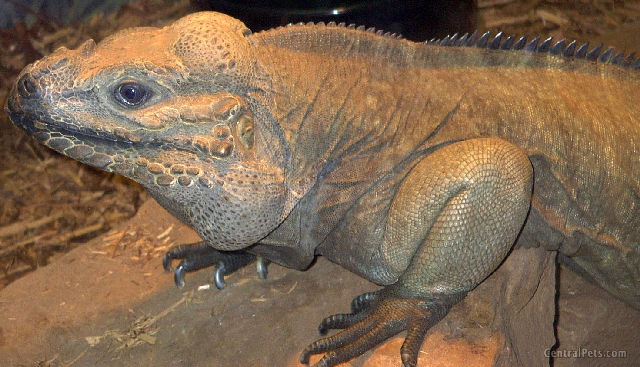|

Rhinoceros Iguanas need large enclosures. A suggested enclosure size for one or two adults is ten feet by ten
feet (three meters by three meters). In most areas, Rhinoceros Iguanas thrive when kept outdoors; however, you should be sure
that they are out of the reach of any predatory animals in your area, if your iguana is out of doors. When temperatures become
too cold, your Rhinoceros Iguana should be brought into an enclosed, heated area. Indoors, a full spectrum UV fluorescent
light is essential for Rhinoceros Iguanas. The ideal daytime temperature for Rhinoceros Iguanas is 80 degrees Fahrenheit (27
degrees Celsius) with a basking spot kept around 105 degrees Fahrenheit (43 degrees Celsius). Nighttime can fall down to cooler
temperatures around 68 degrees Fahrenheit (20 degrees Celsius). In the enclosure, plenty of hiding areas should be available,
including a hide box. Underground hide boxes may be preferred. Both male and female Rhinoceros Iguanas can become aggressive
towards other Rhinos. To avoid injuries an undue stress, it is best to keep the lizards separate outside of breeding season.
Rhinoceros Iguanas are vegetarians. A balanced diet should be made up mostly of dark green, calcium rich leafy greens such
as collard greens, mustard greens, turnip greens, dandelion greens, and kale. Other vegetables and a small amount of fruit
can comprise the remainder of the diet. Winter squash, summer squash, bell peppers, asparagus, and butternut squash are often
good choices, as are green beans and soybeans. A bit of alfalfa hay can be offered from time to time. Grapes, strawberries,
and mango are some recommended fruits. A calcium supplement is recommended, particularly when feeding fruits or low calcium
vegetables such as squash. While Rhino Iguanas do not require any animal protein in their diet, insects, small rodents, and
softened monkey biscuits can be offered; but such foods should comprise no more than 2% of their diet, as excessive protein
can damage the kidneys.
|